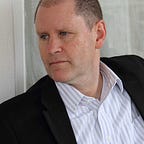The Rise of Hypercapitalism and the Division-Industrial Complex
If they divide us, they will conquer us
One month after I was born and just a few days before John F. Kennedy took office, President Dwight D Eisenhower made his farewell speech to the nation. Unlike the man who would replace him, Eisenhower was never a man of soaring oratory, but the prescience of his final message to the country would prove to be one of his greatest legacies.
America was deep within a cold war in 1961— a new reality of uncertainty in which the potential for nuclear destruction cast a gloomy shadow over our daily lives. And yet — while Eisenhower made reference to our foreign foes and their ideologies — the greatest threat to our way of life, he believed, was right here at home in the form of what he called the military-industrial complex.
Very simply, Eisenhower foresaw the impending convergence of interests when it came to making war and making money — the potential for the market forces of American capitalism to include among them the incentive to create and sustain military conflict. As a two-term president and the five-star general most responsible for leading us to victory through the world’s worst war, his credibility and legitimacy were irrefutable.
